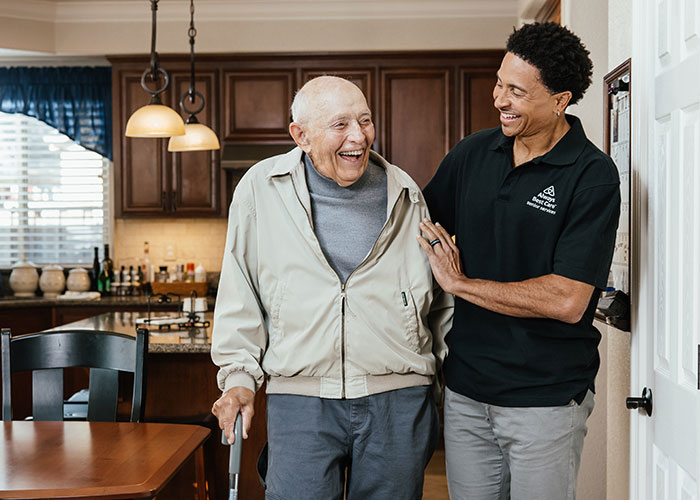How To Ease the Transition into Assisted Living [+ Benefits]
![How To Ease the Transition into Assisted Living [+ Benefits]](https://cdn.alwaysbestcare.com/wp-content/uploads/2024/06/assisted-living-hero-image.jpg)
Does your elderly loved one find it challenging to manage their daily tasks? Or maybe they find it difficult staying at home alone?
If so, it might be time for them to move into an assisted living community.
In this article, we’ll cover the signs that indicate it’s time for assisted living, how to help your loved one transition smoothly, and introduce our senior care services at Always Best Care, including senior referrals.
Table of Contents
What Is Assisted Living?
An assisted living community is a residential option for elderly individuals who need help with daily activities, such as getting dressed, but do not require the full-time care that a nursing home provides.
These communities provide a more independent lifestyle in a supportive environment. This allows residents to maintain as much autonomy as possible while receiving the necessary support to live comfortably and safely.
Assisted Living Communities vs. Nursing Homes
Assisted living communities often resemble private apartments or homes with additional security, housekeeping services, and community activities. Residents have their own space but also have access to common areas for socializing.
On the other hand, the environment of nursing homes is more focused on medical care, equipped with medical devices, hospital beds, and staffed by trained medical professionals, like nurses and therapists.
Rooms may be private or shared, and the setup is focused on accessibility and medical care rather than comfort.
When Is it Time for Assisted Living?
Recognizing when it might be time for an elderly loved one to transition into an assisted living community is crucial for their safety and well-being.
If your elderly loved one is experiencing some of these challenges, it might indicate that it’s time to consider this option:
- Difficulty with daily tasks: If your loved one is struggling with everyday activities such as bathing, dressing, cooking, or cleaning, assisted living can provide the necessary support. In fact, a study found that the demand for home health care is expected to rise, as people are living longer, and more older adults are depending on these services.
- Frequent falls or injuries: An increase in falls or physical injuries can be a sign that the living environment is no longer safe for them alone. Assisted living communities are designed to reduce the risk of falls with safer living conditions and immediate access to help.
- Isolation: Noticeable withdrawal from social activities or loss of interest in hobbies might indicate that living alone is too challenging or lonely.
- Nutritional concerns: If your loved one is losing weight, skipping meals, or unable to cook and eat properly on their own, assisted living can provide nutritious meals — at least two to three meals a day — to keep them nourished and healthy.
- Cognitive decline: Signs of confusion, memory loss, difficulty handling finances, or getting lost in familiar places may suggest that it’s unsafe to continue living alone.
- Safety concerns: If there are safety concerns, such as forgetting to turn off the stove, difficulty moving safely around the house, or wandering, it’s critical to consider a safer living environment.
- Caregiver burnout: If caregiving is taking its toll on family members, assisted living can be a good alternative to support both the caregiver and their loved one.
- Changes in hygiene: Noticeable decline in grooming habits and personal care can be a sign that they are struggling with these tasks on their own.
- Medication management issues: Difficulty managing medications, such as missing doses or taking incorrect amounts, can impact an elderly person’s health. Assisted living communities can help with medication reminders to ensure residents receive the right doses at the correct times.
Key Benefits of Assisted Living
Assisted living offers a wide range of benefits for older adults who require support with daily activities but still wish to maintain a level of independence.
Here are some of the main advantages:
- Support with daily living activities: Assisted living provides help with daily tasks such as bathing, dressing, eating, and medication reminders, allowing residents to maintain their independence while ensuring their health and safety needs are met.
- Improved social engagement: Assisted living communities often have a vibrant community environment, offering different recreational activities, such as birdwatching and playing boardgames. This helps prevent isolation and promotes a higher quality of life through continuous social interaction.
- Increased safety: Assisted living communities are designed with the safety and security of their residents in mind. For example, the physical layout of this type of facility can help accommodate mobility aids, with wide doorways, ramps, and handrails to prevent falls.
- Access to nutritious meals: Residents in assisted living communities can receive nutritious and delicious meals tailored to the dietary needs of elderly individuals. This ensures residents are well-nourished, which is particularly important for family caregivers who might find cooking difficult.
- Maintain upkeep: Assisted living communities usually provide housekeeping, laundry, and maintenance services. This relieves elderly patients from the burdens of home upkeep and allows them to focus on fully enjoying life.
- Access to transportation services: Many assisted living communities provide transportation services, which are a great help for residents who no longer drive. These services make it easy to get to doctor’s appointments, go shopping, or attend community events.
- Enable healthcare monitoring: While most assisted living communities don’t provide intensive medical care, they are ideal for coordinating with healthcare providers to ensure residents stay healthy. For example, doctors play a key role by working closely with nurses and caregivers at the facility. They help manage residents’ health by guiding medical care and creating detailed treatment plans.

Tips for Easing the Transition of Your Elderly Loved One into Assisted Living
Moving an elderly loved one into an assisted living community can be a significant change for both the individual and their family.
Here are some tips to help ease this transition for your loved one:
- Schedule visits before the move: Arrange for regular visits to the facility before the move. For example, you could arrange weekly lunch dates in the facility’s dining hall. This allows your loved one to meet other residents and staff and familiarize themselves with the environment.
- Include your loved one in the decision process: Have them tour different rooms or apartments to pick where they feel most at home. Discuss options for meal plans or activity schedules, ensuring they feel part of the process.
- Personalize your loved one’s space: Customize your loved one’s new space by decorating it with sentimental items like family photos, a cherished quilt, or their favorite books. If possible, try to arrange the furniture like it was in their previous home. This can help create a familiar and comforting environment.
- Maintain a regular visit schedule: Once your loved one moves into the assisted living community, establish a regular visiting schedule, like every Sunday afternoon or twice a week, and make sure to stick to it. Regular visits give your loved one something to look forward to.
- Encourage your loved one to get involved socially: Check out the communities event calendar together and pick out activities they might enjoy, like a knitting club, a book club, or gentle yoga classes. You could even offer to go with them to the first session to help ease them into it.
- Set up communication tools: Ensure your loved one has a simple-to-use smartphone or tablet and install apps like FaceTime or Skype. This can help them stay connected with family and friends, no matter where they are.
- Address your loved one’s healthcare needs: Coordinate with the facility’s healthcare coordinator to set up an initial health review and discuss ongoing management of any chronic conditions, such as diabetes. Make sure they understand your loved one’s medication schedule and any dietary restrictions.
- Listen to your loved one’s concerns: Lend an ear to your elderly loved one and have open discussions about their fears, such as worries about losing independence or missing home. Acknowledge these feelings and discuss how the facility can support their independence and address their concerns.
- Give it time: Understand that it might take a while for your loved one to fully adjust to their new environment. Support them through this period by reminding them of the positive reasons for the move and celebrating small successes, like making new friends or enjoying an activity.
- Stay positive: Keep a cheerful demeanor when discussing the facility and its amenities. For example, highlight the assisted living community’s benefits, like having help readily available.

Explore Senior Living Referral Services & More at Always Best Care
As our loved ones age, some remain relatively healthy while others need help with their care due to health and safety concerns.
At Always Best Care, we understand that the wide range of senior housing options can be overwhelming.
That’s why we’re here to help you find the ideal senior assisted living community that best matches your loved one’s needs and preferences.
Our team of experts will guide you through the selection process, providing insights and advice on facilities that offer the right level of care, amenities, and activities.
We aim to make this transition as smooth and stress-free as possible for you and your family.
Our other senior care services include:
- In-home care: We provide around-the-clock support, including meal prep, laundry, companionship, and assistance with bathing, grooming, and dressing.
- Skilled home health care services: Available in certain areas, we tailor care plans for chronic conditions. Our vetted and trained caregivers and home health aides ensure comprehensive and convenient care.
- Specialized home care services: We support daily social interaction and healthcare management using advanced technology, such as personal emergency response systems (PERS), balance tracking systems, and remote patient monitoring, to efficiently handle symptoms and conditions.
- Respite care services: We provide flexible support, from short breaks to extended care periods, allowing you a well-deserved break from caregiving.
- Dementia care services: We offer compassionate and safe care for loved ones with dementia, focusing on their comfort and well-being.
- Veterans assistance program: We help veterans in getting financial aid for their care as a way to show our gratitude for their service.





